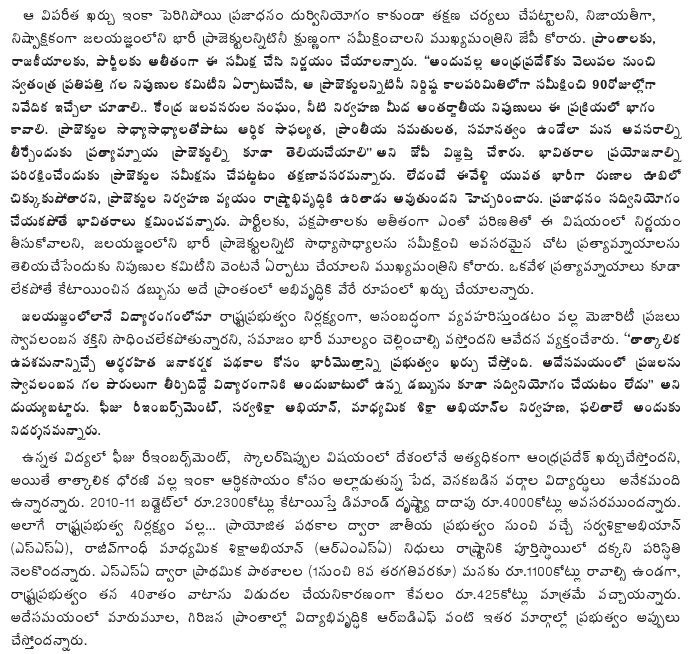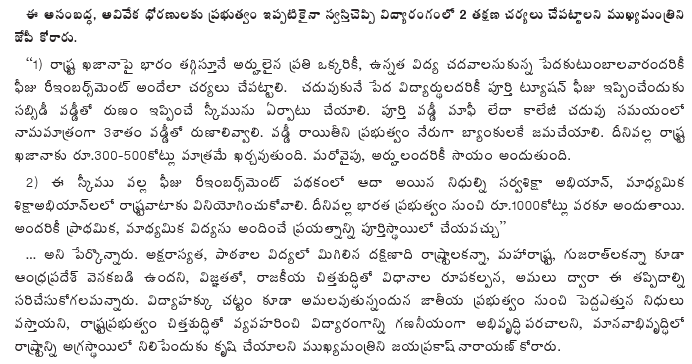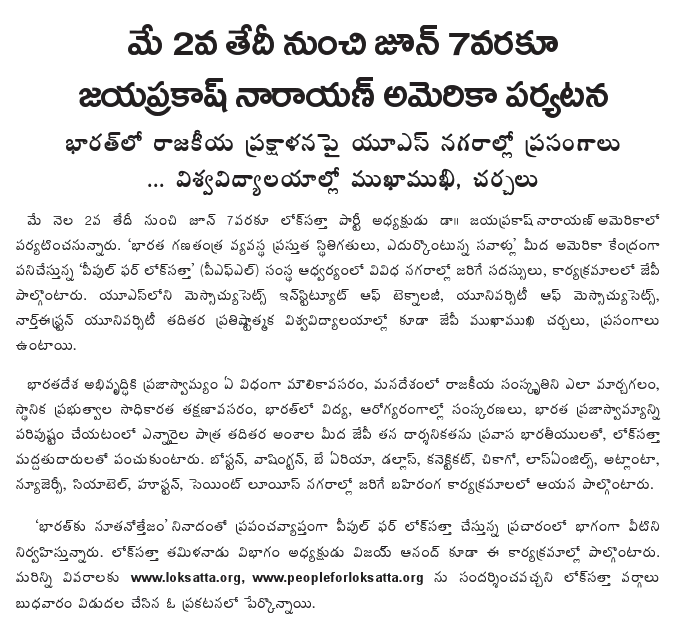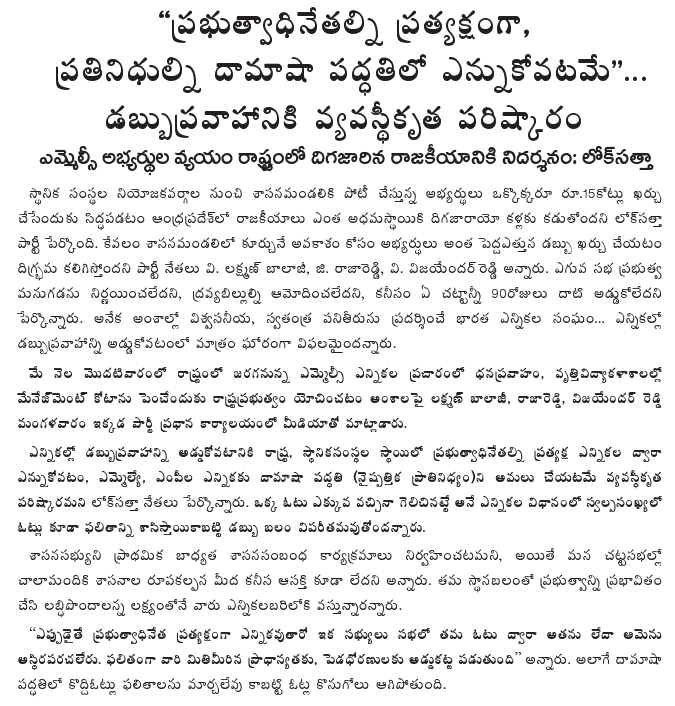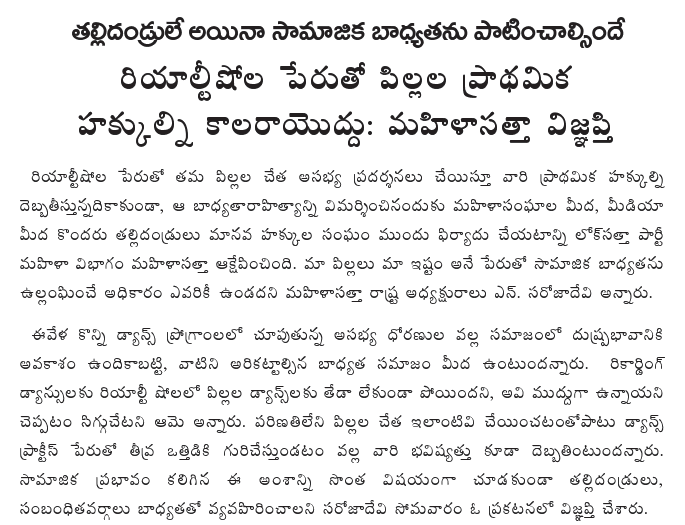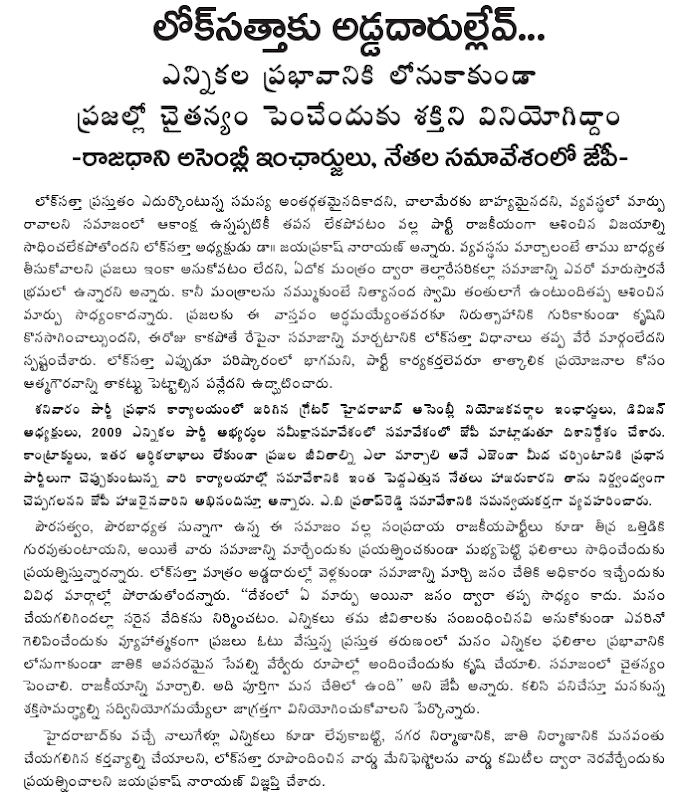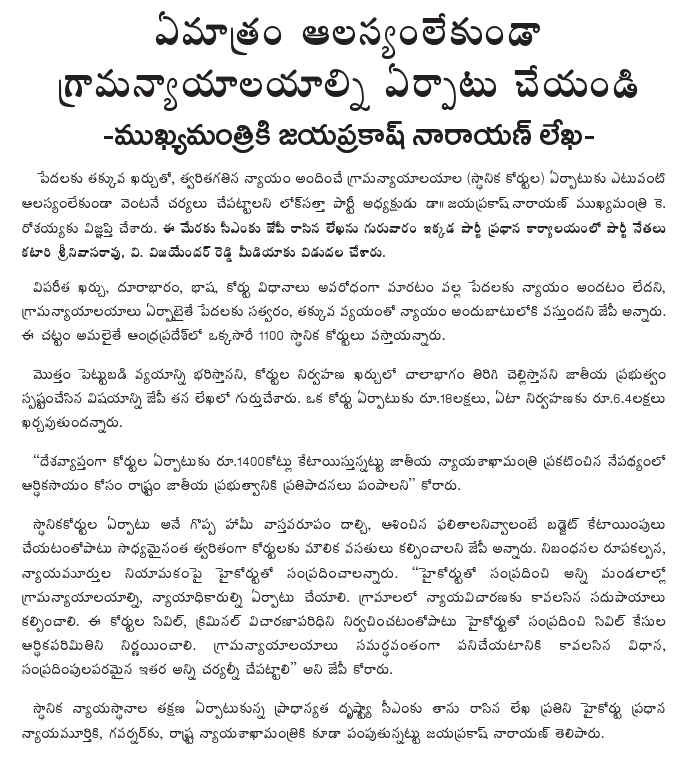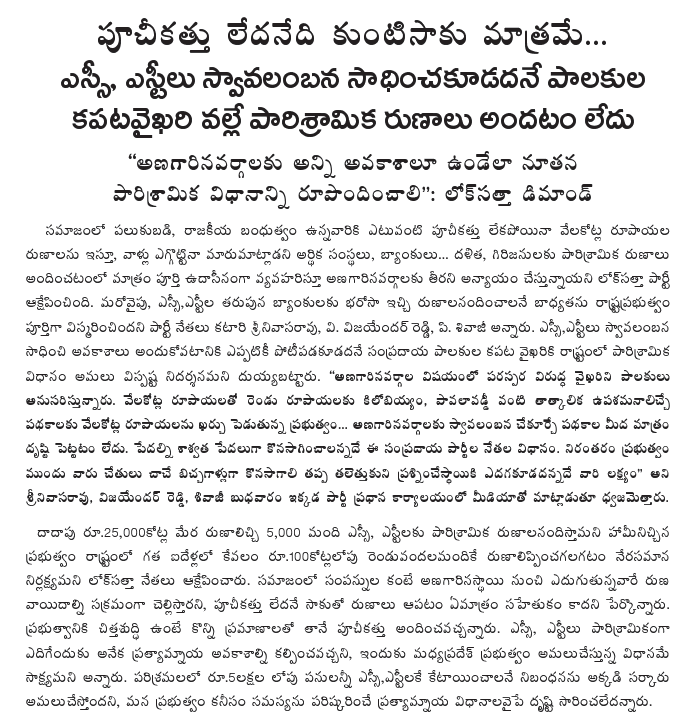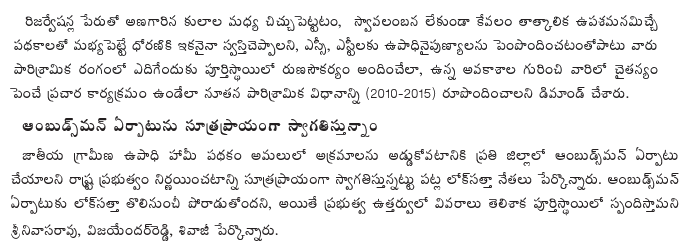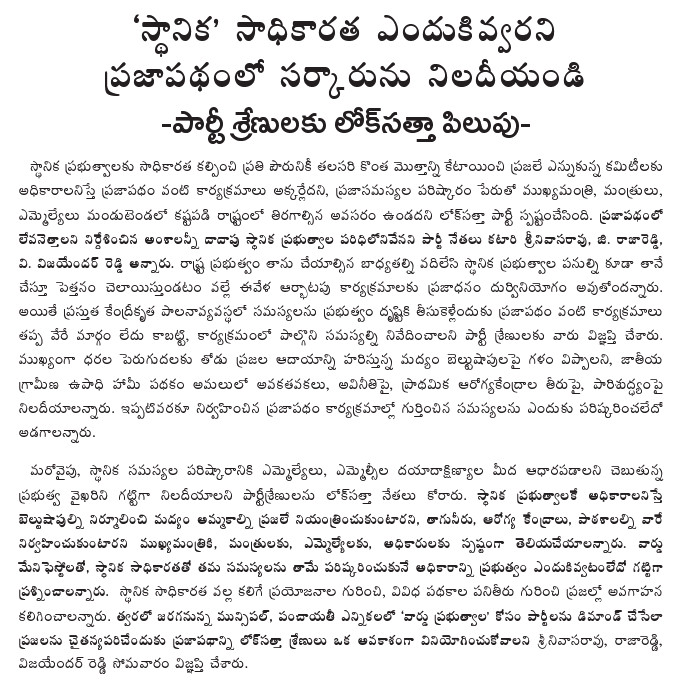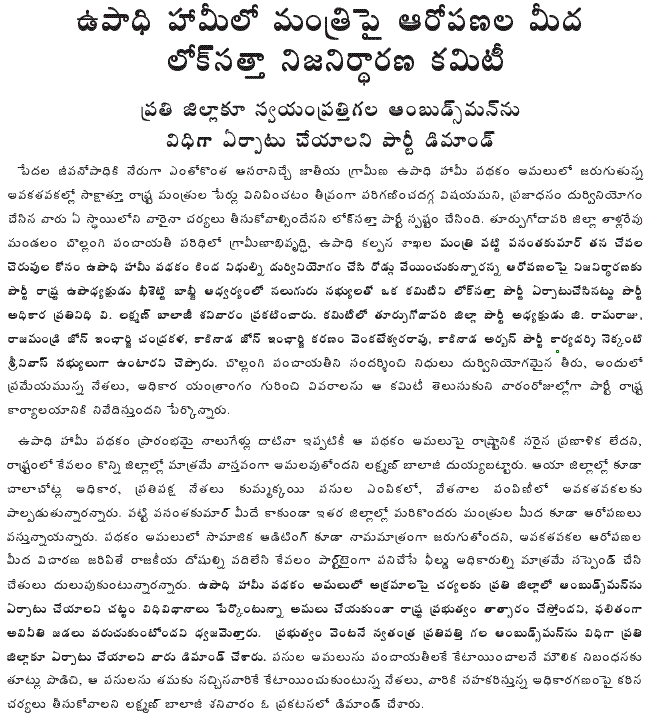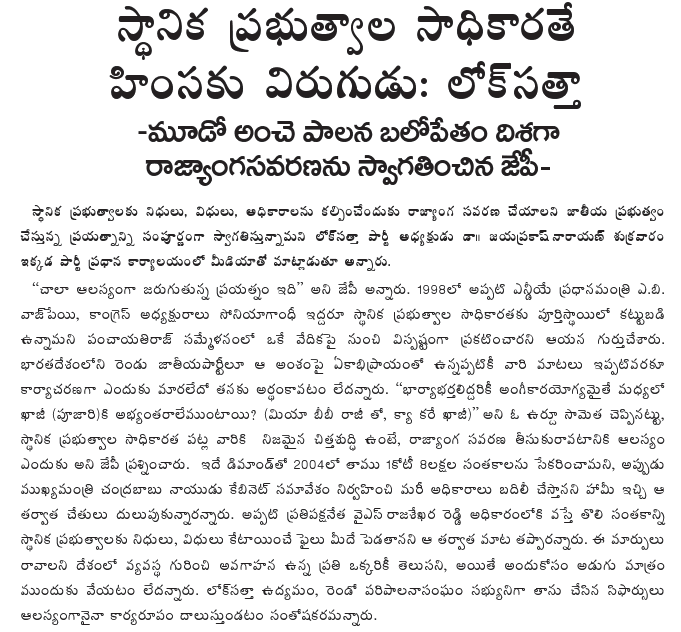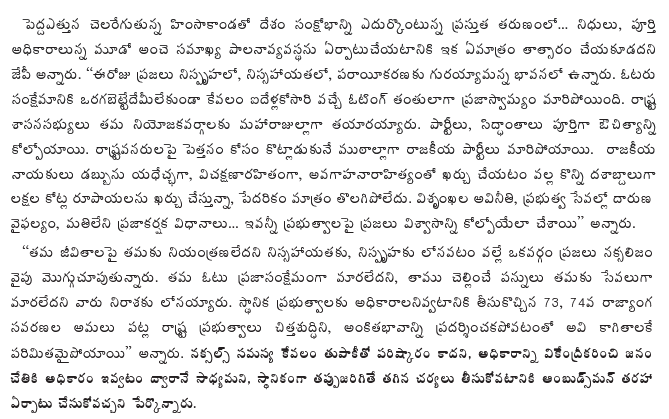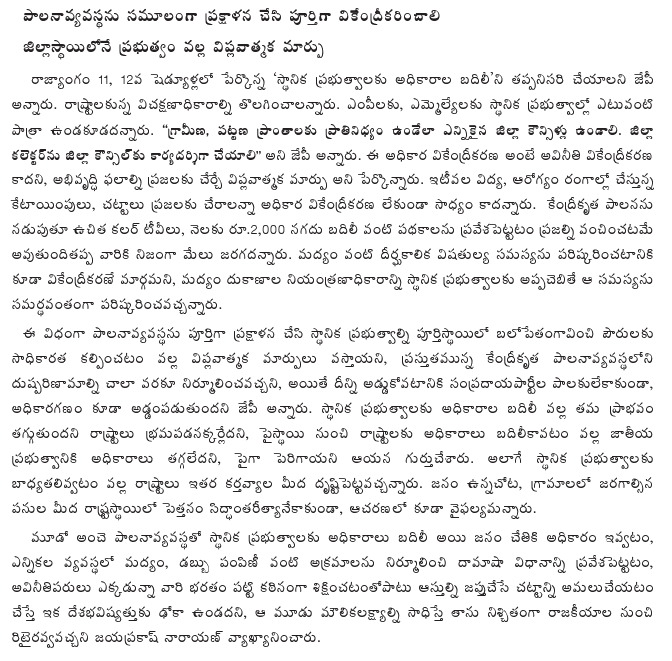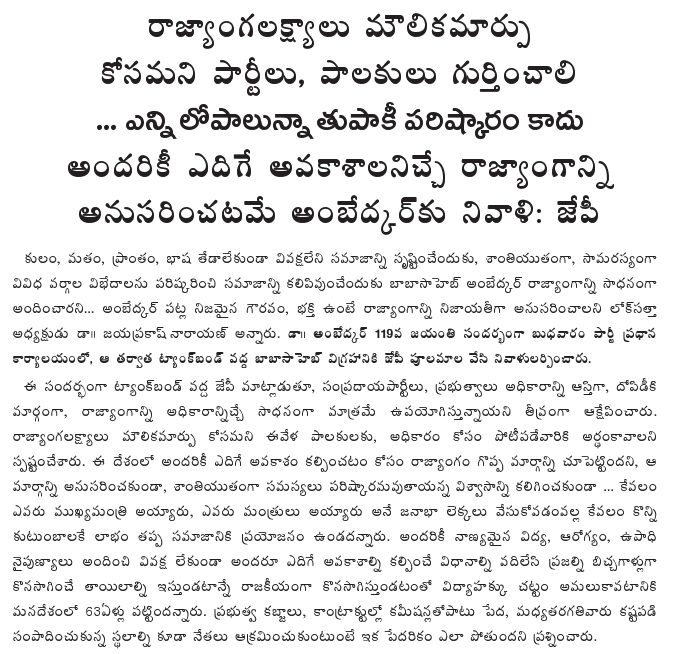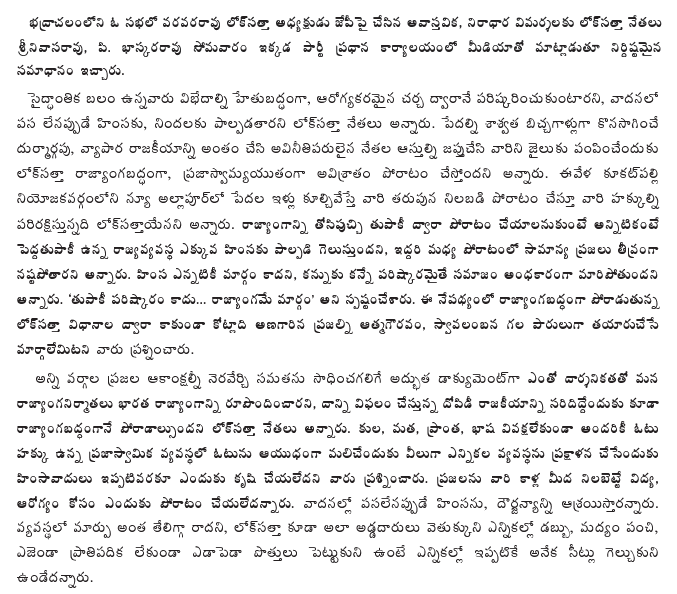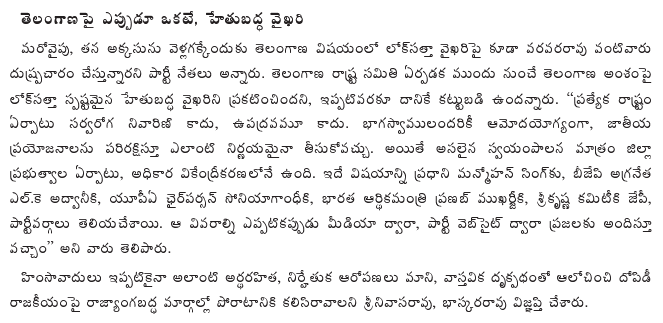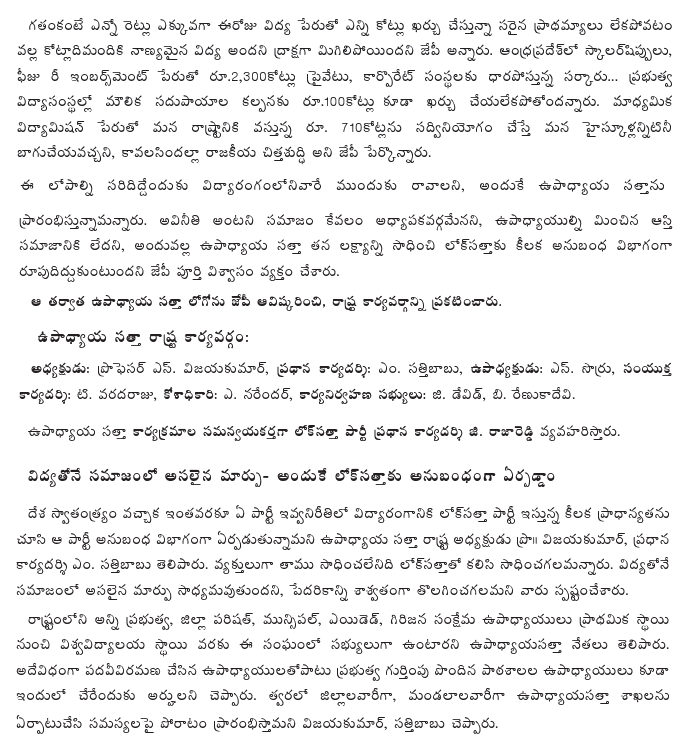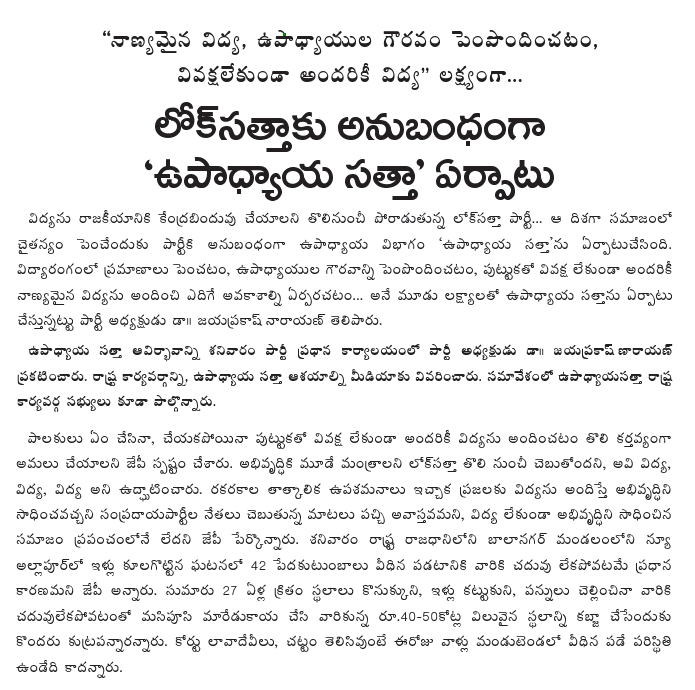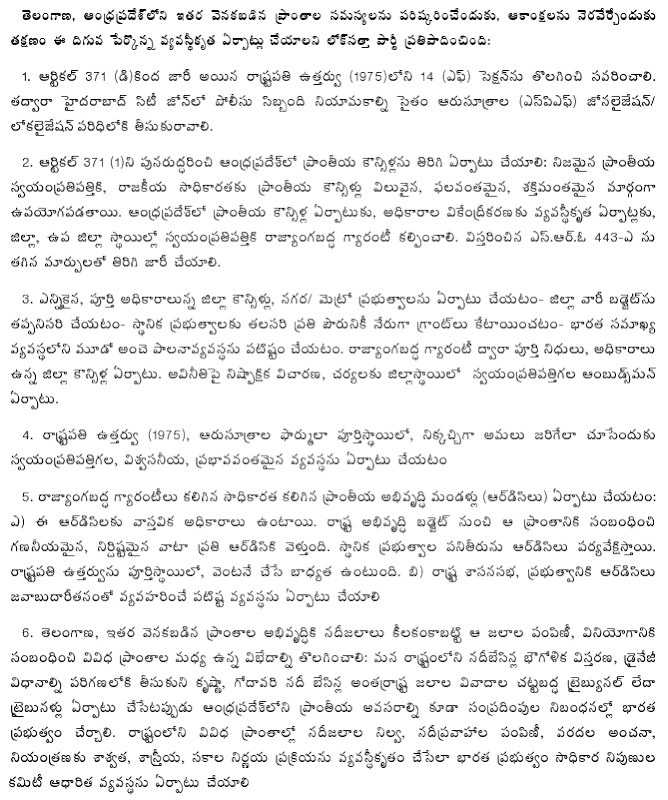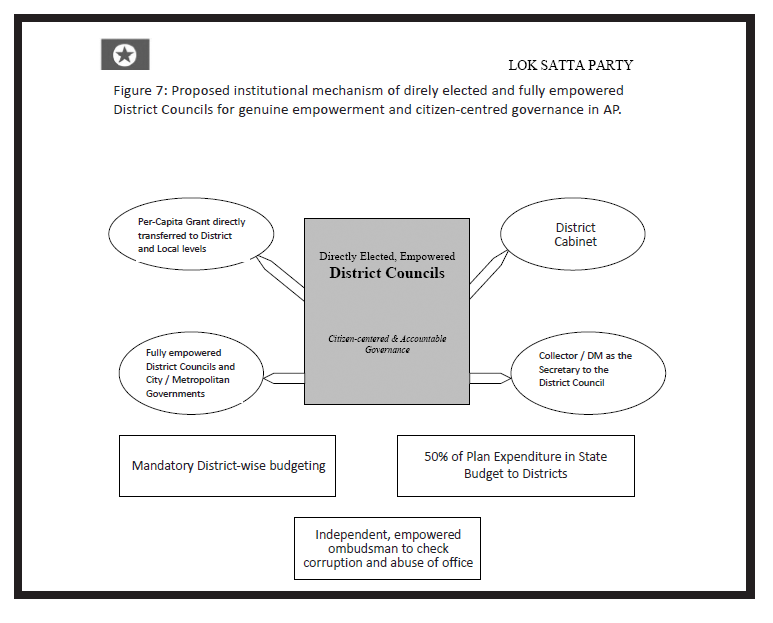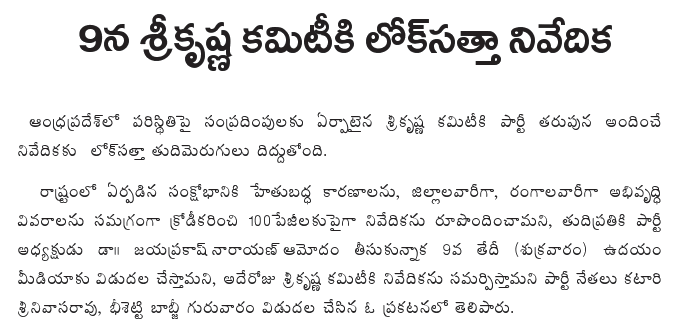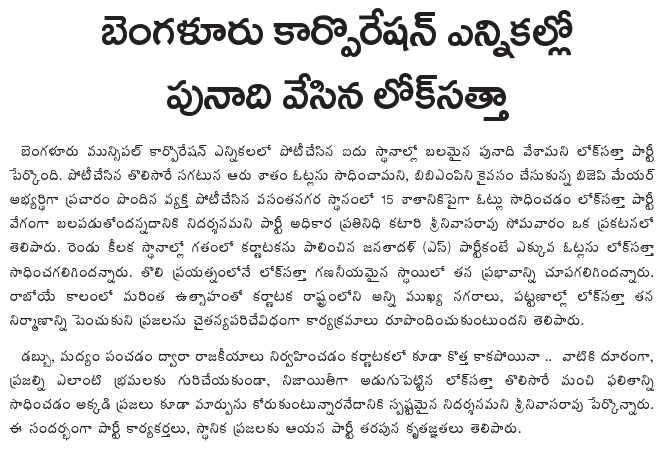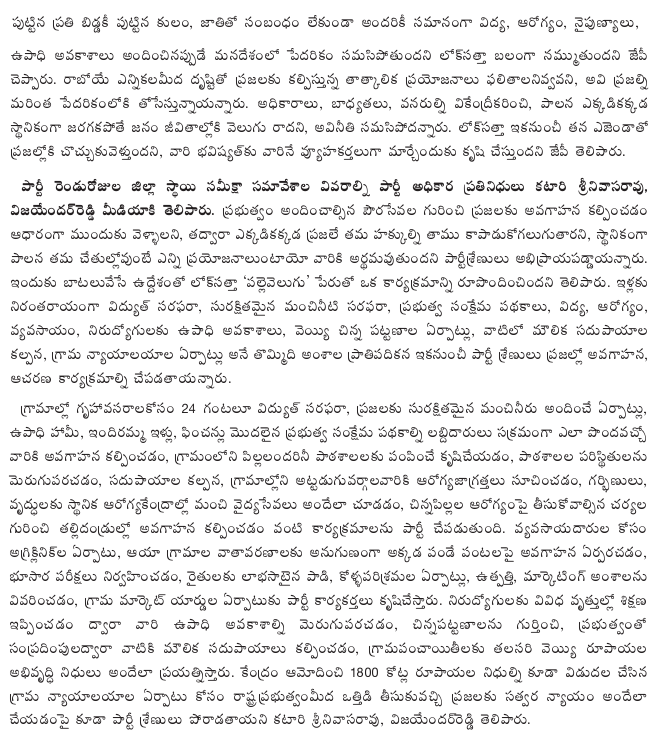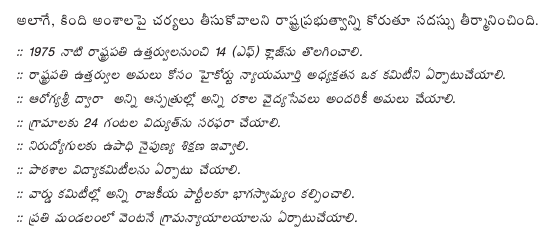
Friday, April 30, 2010
Lok Satta welcomes road map for Empowering local governments
The Lok Satta Party today welcomed the Union Government’s road map for empowering local governments through formation of district councils, reorganization of Legislative Councils with two-thirds representation to local governments and 50 percent reservations for women and rotation of their constituencies once in 10 years.
Talking to the media, party leaders Katari Srinivasa Rao, P. Bhaskara Rao, and Karthik Chandra wanted the Union Government to amend the Constitution providing for mandatory devolution of powers and resources on local governments by State Governments.
The Lok Satta Party suggested that the proposed district councils be empowered to work as district governments with jurisdiction over both rural and urban areas. The district collector should be re-designated as district council secretary.
The Lok Satta would like the Legislative Council to comprise only members elected by local governments. It was strange that the council provides representation to teachers and graduates even to this day.
The party reiterated its long-standing demand that a per capita grant of Rs.1000 should be made to every village, town, and city so that people-elected ward committees could utilize the funds for addressing people’s needs effectively.
The party also demanded creation of 1000 new towns in the State as a means to promote economic development and prevent migration of people from rural areas to far off urban centers in search of work and livelihood.
Thursday, April 29, 2010
Lok Satta for expert team to review ‘Jalayagnam’ projects
Lok Satta Party President Dr. Jayaprakash Narayan has requested the Chief Minister to immediately constitute a team of independent experts drawn from outside Andhra Pradesh to comprehensively review all the projects taken up under ‘Jalayagnam’ and report within 90 days.
He suggested that Central Water Commission and global experts on water management can be involved in this exercise “to not only examine the viability of the projects, but also to propose alternative projects and approaches to fulfill our needs and to ensure economic viability, regional balance, and equity.”
“We should undertake such a review totally impartially, without any bias or prejudice on regional, political or partisan grounds entering into decision making,” said Dr. JP in a letter addressed to the Chief Minister.
Dr. JP said: “Right now, on account of the present and future financial burden of these large projects, the State is getting mired into a deep crisis, and posterity will not forgive us if we do not exercise due care and diligence in public expenditure, and in the discharge of the responsibilities entrusted to our care today.”
Dr. JP said that the State is now facing a financial crisis because of the cumulative impact of unbridled populism, reckless expenditure, unsustainable policies and political expediency notwithstanding the Chief Minister’s success in meeting FRBM targets in the last six years.
Dr. JP pointed out that although ‘Jalayagnam’ is a worthy program conceptually, “several reckless, costly, ineffective, unviable schemes have been taken up without proper analysis of costs and benefits. Alternatives have not been adequately explored. Capital cost is too high in several cases, sometimes running up to Rs.3 lakh per acre. The schemes will involve vast capital expenditure leading to a huge debt burden on the state and high servicing costs. Some of the schemes will be a permanent drain on the State exchequer and will severely aggravate power shortages, since they will need thousands of megawatts of power for lifting water to heights ranging from 500 feet to 1800 feet. Such large lifts over great heights of vast quantities of water were never contemplated even in the richest and most technologically-advanced countries as those nations understood that public money should be spent wisely and people should get the full benefit for every rupee spent. In our state, we have lost sight of elementary principles of managing public finances.”
“Now is the time to thoroughly and honestly review all these large projects before further expenditure is incurred. We should undertake such a review totally impartially, without any bias or prejudice on regional, political or partisan grounds entering into decision making.”
Dr. JP shows a way for availing of Central funds for education
Andhra Pradesh, which has the worst record in literacy and school education among all the four Southern States and Maharashtra and Gujarat, is losing about Rs. 800 – 1000 crore of Central funds for education because of its failure to release its share.
Drawing Chief Minister K. Rosaiah’s attention to the “shocking example of bad management of resources,” Lok Satta Party President Dr. Jayaprakash Narayan said in a letter, “there cannot be a greater abdication of responsibility, and a graver injustice to the poor.”
Apparently, Dr. JP said, “the Government has no will or capacity to utilize money available to improve education and eliminate poverty by helping people to stand on their own feet.”
Dr. JP highlighted the paradox of Andhra Pradesh spending the largest amount among all States in India towards fee reimbursement and scholarships in higher education but not finding the money to meet State’s 40% share of Centrally-sponsored schemes for school education.
Andhra Pradesh allocated Rs.2300 crore in the 2010-11 budget towards fee reimbursement and scholarships in higher education. There is still unmet demand to the tune of Rs.1190 crore. If the total demand is to be met, it will need about Rs.3500 crore in 2010-11. With the imminent increase in tuition fee for engineering education, the burden may go up to Rs.4000 crore.
At the same time, the State is not able to release its share of expenditure in critical Centrally-sponsored schemes like Sarva Siksha Abhiyan (SSA) and Rajiv Gandhi Madhyamika Siksh Abhiyan (RMSA). For instance, in 2009-10 against Rs.1100 crore projected program under SSA meant for primary schools (from Class 1 to Class 8), the State could utilize only Rs.425 crore. Similarly, this year the budget allocation under RMSA meant for high schools and junior colleges is about Rs.700 crore. But by current indications, the State will not be able to utilize more than Rs.150 – 200 core.
Dr. JP did not stop with taking exception to the Government’s skewed priorities. He suggested that the fee reimbursement scheme be redesigned to meet the full, genuine demand from all eligible, poor families but eliminate the rich availing of the facility. The Government should facilitate education loans to all poor students and come forward with a scheme to subsidize interest payable by students. Then the burden on the State will be only of the order of Rs 300 crore – 500 crore and yet all the deserving students can be covered.
“The money so saved can be utilized as State’s share of SSA and RMSA. The State will thus get an additional Rs.1000 crore from the Government of India for education for the poor. Both SSA and RMSA can then be implemented in full measure.”
Wednesday, April 28, 2010
Dr. JP to take part in ‘Rejuvenate India’ Campaign in US
Lok Satta Party President Dr. Jayaprakash Narayan (JP) and Lok Satta Tamil Nadu President Vijay Anand will be visiting the U. S. from May 5 to June 2 to take part in events being organized People for LokSatta (PFL), a nonprofit organization, as part of its "Rejuvenate India" worldwide campaign.
As part of the "Rejuvenate India" campaign, Dr. JP and Mr. Vijay Anand will discuss the current state of Indian Republic and the challenges in front of it. Topics of discussion will include:
- Why is democracy fundamental to India's Growth
- How can we alter the culture of politics in India
- Need for localization of governance
- Education and healthcare reforms in India
- The role of NRIs in strengthening Indian democracy
Dr. JP is scheduled to speak at Chicago Booth India Leadership Summit, Massachusetts Institute of Technology, University of Massachusetts and Northeastern University. He will be visiting almost all important cities in the U.S. and interacting with NRIs.
Tuesday, April 27, 2010
Lok Satta advocates direct elections to Curb money power
That candidates contesting to the Legislative Council from local bodies’ constituencies are prepared to spend up to Rs.15 crore merely reflects the depths of depravity to which politics in Andhra Pradesh have plunged, commented the Lok Satta Party here today.
Talking to the media, party leaders Mr. V. Laxman Balaji, Mr. G. Raja Reddy, Mr. V. Vijayendar Reddy said it was amazing that for the mere prospect of sitting in the Legislative Council candidates are prepared to spend enormous amounts. The Upper House cannot decide the fate of the Government, pass any money Bills or even delay any legislation beyond 90 days.
The Lok Satta leaders said that despite its credible and independent functioning in many aspects, the Election Commission of India had miserably failed in curbing money power in elections.
A systemic remedy to the problem lies in direct election of heads of Government at the State and local levels and a switch over to proportional representation for election of all MLAs and MPs. Money power has become ubiquitous under the first-past-the-post system because the marginal vote influences the election outcome.
A legislator’s primary job is to attend to legislative work. Unfortunately most of our legislators are least interested in it. Their sole aim in getting elected is to enjoy the privilege of influencing the executive by virtue of their position.
Once people elect the head of a Government directly, legislators cannot destabilize him or her with their vote in the House, and as a result will lose all their clout. With proportional representation marginal vote will not be vital, and therefore vote buying will end.
On the State Government’s move to increase the management quota in professional colleges from the present 30 to 40 percent, the Lok Satta leaders said they could understand Government’s anxiety to limit the outgo on fee reimbursement and grant of scholarships. As of now, the State has allocated only Rs.2300 crore against the needed Rs.3490crore.
A solution to the problem does not lie in increasing the management quota. Higher education is already highly commercialized as a result of which a child’s education and career are dependent on his or her parents’ wealth. Education should be a tool to provide equitable opportunities for growth to all children.
The Lok Satta leaders said that the Government could reduce its burden if it facilitates liberal education loans to all economically and socially weaker sections and subsidizes the interest burden based on the student’s attendance and academic performance.
Because of poor targeting, even children of high income groups are availing themselves of fee reimbursement and scholarships.
The Lok Satta’s innovative proposal will cost the Government less than Rs.500 crore against the Government’s present commitment of Rs.2300 crore and the needed Rs.3490 crore, and will ensure justice to all poor students.
Monday, April 26, 2010
Don’t trample upon kids’ rights: Mahila Satta
The Mahila Satta today took strong exception to some parents defending performance of vulgar dances by their children in the name of reality shows.
Mrs. N. Saroja Devi, State Mahila Satta President, said in a statement that encouraging children to take part in vulgar performances on television would harm their future.
Far from mending their irresponsible behavior, Mrs. Saroja Devi said, it was strange that some parents had lodged a complaint with the Human Rights Commission asserting that since children belonged to them, others had no business to dictate to them. Such parents were guilty of violating their children’s rights and unacceptable social behavior.
Saturday, April 24, 2010
The journey is long and arduous, Dr. JP tells Party workers
Notwithstanding the latent desire among people for a change in the nature of politics, they are not prepared to become agents of change, said Lok Satta Party President Dr. Jayaprakash Narayan here today.
Addressing Greater Hyderabad party workers and leaders including those who contested the 2009 Assembly and GHMC elections, Dr. JP said that people are under the illusion that a Messiah will arise and transform society and politics with a magic wand.
Dr. JP recalled that nowhere in the world change has taken place without people associating themselves with it. As of now, people go to the polling booth to elect somebody or the other without realizing that the vote is a means to transform their lives. Against such a backdrop, the Lok Satta has to suffer electoral setbacks. But that should not be a cause for despair. “However long and arduous the journey is going to be we should plod on since there is no alternative to Lok Satta’s philosophy and programs.
Expressing happiness over the large turnout of party activists for the meeting, Dr. JP said they had come to discuss means for improving people’s lives and not in anticipation of any personal gain.
While traditional parties pursued the single-point agenda of coming to power at any cost to serve their narrow interests, the Lok Satta strove to transform society and politics by empowering people. There are no short cuts to accomplishing the mission.
He wanted party workers to pursue the implementation of ward manifstos prepared by the party during the next four years. Mr. A. B. Prathap Reddy, GHMC Unit in charge, presided.
Friday, April 23, 2010
Slashing seats in IIITs unwarranted: Dr. JP
Lok Satta Party President Dr. Jayaprakash Narayan said here today that the State Government decision to slash the number of seats in IIITs from 6000 to 3000 reflected its “penny-wise pound-foolish fiscal management”.
Talking to the media, Dr. JP pointed out that continuance of seats would impose a burden of mere Rs.24 crore a year on the Government. The IIITs are meant to provide job-oriented technological skills to bright students from rural areas. Because of its skewed priorities and lack of sincerity, the Government has decided to axe the seats much to the detriment of the younger generation.
What is more galling is, Dr. JP said, that the harmful decision has been taken by a Government which in the name of ‘Jalayagnam’ is building projects even without water and turning a blind eye to monumental corruption. He hoped that the wise Chief Minister would reverse the decision.
On the Government decision to appoint ombudsmen to go into irregularities in NREGS implementation, Dr. JP said the proposed setup would not serve the purpose. First, a sitting fee of Rs.500 a day would not attract talent. Secondly the proposed ombudsmen’s powers are limited to inquire into irregularities thrown up by social audit.
Instead, ombudsmen should be appointed to go into allegations of corruption and irregularities in all schemes including the NREGS by local governments. After all, each district is spending Rs.2000 crore a year under various schemes.
The ombudsmen should be autonomous and powerful to take action on their own against guilty elected public representatives and employees.
On the CBI catching Medical Council Chairman red-handed as he accepted a Rs.2-crore bribe, Dr. JP recalled he had drawn the Prime Minister’s attention to corruption in the grant of medical colleges. What has been detected is merely the tip of the iceberg.
Although thousands of crores of rupees changed hands in the medical education sector, the country has not been able to produce competent doctors. A solution lies in awarding degrees only if medical students pass an examination like the one conducted for chartered accountants on completion of formal education.
Thursday, April 22, 2010
Letter to C.M. on Gram Nyayalayas
22nd April, 2010
To
Sri K. Rosaiah
The Chief Minister of Andhra Pradesh
AP Secretariat
Hyderabad.
Sub: Immediate implementation of The Gram Nyayalayas Act, 2008 (Act 4 of 2009) – Reg.
As you are aware, the Parliament of India has enacted the landmark Gram Nyayalayas Act. The Bill was passed in both Houses of Parliament in December, 2008 and the President of India gave her assent on 7th January, 2009. This historic achievement will greatly contribute towards restoring the culture of the rule of law which has been gradually eroded. This statute offers the great promise of speedy, accessible and affordable justice to the poor who have hitherto not been able to access courts because of barriers posed by costs, distance, language and procedural difficulties.
This enabling law, at one stroke, provides for the creation of over 1100 local courts in Andhra Pradesh - under the law, every intermediate panchayat (Mandal) would have at least one rural court. All these local courts will be an integral part of the independent justice system, which is the corner stone of our Constitution and rule of law.
Now, in order to ensure that this great promise is converted into actual, tangible outcomes - at the earliest, the State Government must undertake the following steps, as per the provisions of The Gram Nyayalayas Act, 2008 (Act 4 of 2009).
- Establishment of Gram Nyayalayas in all Mandals, in consultation with the High Court (Section 3 (1)).
- Appointment of Nyayadhikaris in consultation with the High Court (Sec 5).
- Ensuring necessary facilities for enabling the conduct of trials in the villages (Sec 9).
- Defining the civil and criminal jurisdiction of these courts (Sec. 12 (2) and 14 (3) read with the First and Second Schedules).
- Approaching the High Court for setting pecuniary limits of civil cases to be tried by these courts (Sec. 13(2)).
- We understand that the Union Government has conveyed its commitment to: (i) bearing the entire capital cost of setting up of these courts (estimated to be around Rs. 18 lakhs per one such Gram Nyayalaya) and (ii) reimbursing a substantial part of the running costs of these courts (estimated to be around Rs. 6.4 lakhs per court per year). Reports indicate that the Union Law Minister has announced the allocation of Rs. 1400 crores for the setting up of Gram Nyayalayas across the country this year. Now that such funding is available, the State Government should ensure the allocation of adequate financial resources for these courts, by sending proposals to the Union government for financial assistance.
- Other procedural, administrative and consultative steps to expeditiously constitute Gram Nyayalayas and ensure their smooth and efficient functioning.
Now that the law is in place, it is imperative that urgent steps are taken to constitute the local courts to help the poor and ensure speedy justice. I therefore urge you to immediately approach the High Court of Andhra Pradesh and initiate the steps necessary to constitute the courts at the earliest. Preparatory work on the above lines needs to be completed before the courts are constituted. In particular, budgetary allocations, making available the necessary infrastructure, framing of rules by both the Government and the High Court and appointment of the Nyayadhikaris have to be taken up immediately.
In view of the importance of the issue, I am marking a copy of this letter to the Chief Justice of the High Court of Andhra Pradesh, Governor of Andhra Pradesh and the State Law Minister and making the contents public.
Sincerely,
Jayaprakash Narayan
President
Copy to:
Justice Nisar Ahmed Kakru, Chief Justice of Andhra Pradesh High Court.
Sri ESL Narasimhan, Governor of Andhra Pradesh.
Sri MV Raman Rao, Minister for Law and Courts, Govt. of Andhra Pradesh.
Set up rural courts without delay, Dr. JP requests CM
Lok Satta Party President Dr. Jayaprakash Narayan has requested Chief Minister K. Rosaiah to take immediate steps for constituting gram nyayalayas (rural courts).
The Gram Nyayalayas Act promises speedy, accessible, and affordable justice to the poor who have gone without it because of barriers of costs, distance, language, and procedures.
This enabling law, at one stroke, provides for the creation of over 1100 local courts in Andhra Pradesh.
In a letter to the Chief Minister, Dr. JP recalled that the Union Government is committed to bearing the entire capital cost and reimbursing a substantial part of the running costs of the courts. Setting up a court will cost around Rs.18 lakh and its annual maintenance, Rs. 6.4 lakh.
Since the Union Law Minister has announced the allocation of Rs.1400 crore for setting up courts across the country this year, the State should send proposals to the Union government for financial assistance.
Dr. JP requested the Chief Minister to make budgetary allocations, and provide infrastructure for the courts and approach the High Court on the framing of rules and appointment of judges.
Dr. JP marked a copy of the letter to the Chief Justice of the High Court, the Governor, and the State Law Minister.
Party spokespersons Mr. Katari Srinivasa Rao and Mr. V. Vijayendar Reddy released the text of Dr. JP’s letter at a media conference here today.
Wednesday, April 21, 2010
SC, ST entrepreneurs denied Loans: Lok Satta Party
The Lok Satta Party today charged financial institutions with bias and the State Government with indifference in going to the assistance of SC and ST entrepreneurs.
Talking to the media, party spokesperson Katari Srinivasa Rao pointed out that banks and other financial institutions extended loans freely and without even collaterals to the socially well connected while they denied loans to SC and ST entrepreneurs without any collateral guarantee.
The State Government which had promised to arrange financial assistance of Rs.25,000 crore to 5000 SCs and STs in five years had enabled only 200 SCs and STs to access bank loans of less than Rs.100 crore.
Mr. Srinivasa Rao said that the Government squandered thousands of crores of rupees on populist schemes like supply of rice at Rs.2 a kg which merely perpetuated poverty. In contrast, grant of loans to SC, ST entrepreneurs would make them self-reliant.
If the Government has the will, it can facilitate bank financing by providing guarantee to SC, ST entrepreneurs.
Mr. Srinivasa Rao welcomed the State Government decision to appoint an Ombudsman in each district to go into irregularities in National Rural Employment Guarantee Scheme implementation.
Monday, April 19, 2010
Empowerment of local governments Makes Praja Patham redundant - Lok Satta
If only the State Government had empowered local governments, there would have been no need for Ministers, MPs and State legislators visiting villages in hot summer in the name of addressing people’s problems.
Commenting on ‘Praja Patham’ launched by the Government all over the State, the Lok Satta Party said in a statement that successive governments in the State had emasculated local governments, denied them the powers, responsibilities and resources they are entitled to under the 73rd and 74th Constitutional amendments and focused on centralizing powers at the State level.
‘Praja Patham’ is an eloquent testimony to concentration of power in the hands of the State Government at the cost of local governments,” said Mr. Katari Srinivasa Rao, G. Raja Reddy and Mr. V. Vijayender Reddy, party spokespersons in the statement.
The Lok Satta Party, however, called upon its cadres to take part in ‘Praja Patham’ since it still provided a forum for redressal of local problems. It wanted them to pin down people’s representatives for devolution of powers, responsibilities, resources and personnel on local bodies. They should draw the attention of officials and people’s representatives to the havoc belt shops are causing, the irregularities in implementation of Government schemes like NREGS, and grant of pensions, houses and ration cards.
Sunday, April 18, 2010
Lok Satta Fact Finding Committee to Visit Minister’s Village
The Lok Satta Party has decided to send a fact-finding committee to Chellangi Panchayat, Tallarevu Mandal in East Godavari district, where Mr. Vatti Vasantha Kumar, minister for rural development is alleged to have got a road laid to his fish pond under the NREGS.
The committee will be headed by Mr. Bhisetty Babji, vice president of Lok Satta Party. The other members of the committee are Mr. G. Ramaraju, Party East Godavari district incharge, Mrs. Chandrakala, Rajahmundry zone incharge, Mr.Karanam Venkateswara Rao, Kakinada zone incharge, Mr.Nekkanti Srinivas, Party Kakinada urban secretary. The team will submit its report to the headoffice within a week, told the Party spokes person Mr.V.Laxman Balaji in a statement today.
Friday, April 16, 2010
Empowering local governments alone Can stave off violence: Dr. JP
Lok Satta Party President Dr. Jayaprakash Narayan today wholeheartedly welcomed the Union Government’s move to amend the Constitution to empower local governments.
Talking to the media, he said the move has not come a day too soon. He recalled that as early as in 1998, both the then NDA Prime Minister A, B. Vajypayee and Congress President Mrs. Sonia Gandhi had shared the dais at a panchayati raj sammelan and committed themselves to empowering local governments. He could not understand why it had taken so far to translate their words into action when both of India’s national parties had no differences on the issue. He quoted an Urdu saying -- “Mia Bibi Raji To, Kya Kare Kazi” – (the cleric or kazi has no role to play if the spouses have reached a compromise) – to underline that there was no justification for the delay in bringing about the Constitutional amendment unless their commitment was not genuine.
Dr. JP said it was high time an effective and empowered third tier of the federal set-up was unveiled, considering that the country was facing a grave crisis with potential for outbreak of violence on a large scale. “People today feel frustrated and disempowered. Democracy has been reduced to a farce of voting once in five years with no consequences in terms of the voter’s welfare. State legislators have become monarchs of their fiefdoms. Parties and ideologies have lost all relevance. Political parties have transformed themselves into warring factions to control State’s resources. Poverty has not been eradicated although lakhs of crores of rupees have been spent for decades, because politicians have squandered or swindled or misdirected public resources. Monumental corruption, miserable delivery of services and mindless populism have all sapped people’s faith in governments.”
Dr. JP said that “it is a sense of helplessness and despair over lack of control over their lives that are driving a section of people to embrace naxalism. They are frustrated because their vote has not translated into public good and their tax contributions have not led to delivery of services. The 73rd and the 74th Constitutional amendments aimed at empowering local governments have remained on paper because State Governments are not sincere or serious about implementing them.”
Dr. JP said that transfer of powers mentioned in the 11th and 12th schedules of the Constitution to local governments should be mandatory. The States shall be stripped of their discretionary powers. MPs and State legislators should have no role to play in local governments. There shall be an elected district council representing both rural and urban areas. The District Collector shall be made Secretary of the district council.
Empowerment of citizens through strengthening the local governments will go a long way in mitigating the evils of the present centralized system of administration, he said.
Wednesday, April 14, 2010
Abide by Constitution, Dr. JP Tells extremists
The greatest tribute we can pay to Baba Saheb Dr. B. R. Ambedkar is to abide sincerely by the wonderful Constitution he helped craft, said Lok Satta Party President Dr. Jayaprakash Narayan here today.
Addressing a gathering after garlanding Dr. Ambedkar’s statue on Tank Bund on his 119th birth anniversary, Dr. JP said the Constitution aimed at creating a society without discrimination based on religion and caste, region and language and at harmonizing conflicting interests peacefully.
Dr. JP said that traditional parties viewed the Constitution as a means to attaining power and enriching themselves at the cost of people instead of as a tool to provide growth opportunities for all by ensuring quality education and health care and livelihood skills and employment avenues.
It was true that many blunders had been committed in the last 60 years in the implementation of the Constitution because of which discrimination and repression continue even to this day. The blunders could not be rectified through a resort to the gun and violence as some believe, since the State wields bigger guns and is capable of greater violence. Common people are trampled when extremists wage a war against the State.
Dr. JP counseled that the Constitution be used as a means to bring about transformation in society peacefully.
Dr. JP recalled that Dr. Ambedkar likened the Constitution to a temple. He passed away regretting that even before deities could be installed in it, devils had taken it over. He underlined the need to maintain the sanctity of the Constitution and to make politics a noble profession.
Among Lok Satta leaders who took part in the function were V. Laxman Balaji, V. Vijayender Reddy, E. Chennayya, Dasari Ratnam and N. Saroja Devi.
Monday, April 12, 2010
Replace gun with vote, Lok Satta Tells naxalites
“Revolutionary Writers’ Association leader Varavara Rao and some others have been indulging in a campaign of calumny against Lok Satta Party President Dr. Jayaprakash Narayan because he condemned Mr. Varavara Rao’s justification of and encouragement to naxalite violence in a discussion on a private news channel,” said the Lok Satta Party here today.
Talking to the media, Lok Satta Party leaders Katari Srinivasa Rao, V. Vijayender Reddy and P. Bhaskara Rao said that some detractors had gone to the extent of even spreading blatant lies. One of them was that Dr. JP did not call on a girl rape victim of Kukatpally, which he represented in the Assembly. In fact, Dr. JP not merely called on the girl but also pursued the case to ensure that the accused did not escape.
The Lok Satta leaders that those who believed in power through the barrel of the gun should realize that the State with more guns of bigger barrels would trounce them. It is the common people who get trampled in fight between the naxalites and the State. “An eye for an eye”, to quote Mahatma Gandhi, “would leave the world blind”, they added.
Dr. JP too would like to see the State wither away as dreamed by naxalites. But the Lok Satta stood for non-violent naxalism. That was why the party in the 2009 general elections issued its party ticket to a former naxalite who bade goodbye to the gun.
The Lok Satta Party believes that if people are empowered and corrective mechanisms put in place, they can look after themselves. Then the State becomes a mere facilitator and coordinator.
Pointing out that the Indian Constitution is a wonderful document which provided universal franchise without discrimination based on caste and religion, language and region, they asked why the naxalites have so far not tried to persuade people to use the weapon of vote to realize their hopes and aspirations by changing the political system.
The Lok Satta leaders underlined that the Lok Satta had taken a consistent stand on the demand for Telangana. It believed that formation of Telangana would neither be a panacea nor a catastrophe. People stood to gain only when district governments are formed and powers decentralized. Dr. JP had conveyed the same to national leaders of both the ruling party and the Opposition.
Saturday, April 10, 2010
Lok Satta launches Upadhyaya Satta
Lok Satta Party President Dr. Jayaprakash Narayan today launched the party’s teachers’ wing – Upadhyaya Satta – with the triple objective of improving educational standards, restoring respect to teachers and ensure equal opportunities to every child without any discrimination to realize its potential.
Dr. JP, who unveiled the Upadhyaya Satta’s logo to mark the inauguration of the organization, said there is no society in the world which has registered progress without education. Teachers are the wealth of any society.
Dr. JP pointed out that 42 poor families in Allapur of Balanagar mandal in Hyderabad city today faced eviction from their houses because they happened to be illiterate. They had bought the sites 27 years ago, constructed houses, and paid taxes; yet some land grabbers sought to throw them out.
Dr. JP regretted that many schools and junior colleges went without buildings, teachers and basic facilities like toilets and drinking water. Given to worshipping money and muscle power, the society has ceased to hold teachers in high esteem as in the past.
Because of its skewed priorities, the State Government spent Rs.2300 crore on scholarships and fee reimbursement to students benefiting mostly corporate institutions but would not allocate even Rs.100 crore to provide basic facilities in them.
Pointing out that the State would be receiving Rs.710 crore under the Rashtriya Madhyamik Siksha Abhiyan, Dr. JP wanted the State Government to utilize part of the funds for provision of basic amenities in schools and junior colleges.
Prof. S. Vijayakumar, President and Mr. M. Sattibabu, General Secretary of the Upadhyaya Satta, said that they had chosen to associate themselves with the Lok Satta Party because no other party attached as much importance as the Lok Satta to the education sector. They asserted that their organization would be different from the 25-odd other teachers’ organizations in the State. Mr. G. Raja Reddy, Lok Satta Party General Secretary, would liaison with the Upadhyaya Satta.
Friday, April 9, 2010
Loksatta's Report to Srikrishna Committee
Telangana or no Telangana, Governance Reforms a must: Lok Satta Party
"A mere change of the State's name or boundaries or capital will not alter anything unless fundamental governance reforms are ushered in," says the Lok Satta Party in its report to the Justice Srikrishna Committee, which is inquiring into the situation in Andhra Pradesh.
In its 117-page report, the Lok Satta says that "we can decide either way" on Telangana provided all stakeholders are satisfied, national repercussions addressed, and the real solution of district governments is implemented. Strong views are not necessary, as separation is neither a catastrophe, nor a panacea."
Lok Satta Party President Dr. Jayaprakash Narayan released the report at a media conference here today.
The party warns against adopting a casual approach to the demand for Telangana. It points out that Andhra Pradesh is the first non-Hindi state witnessing demands for division despite a common language. "It is important to have a national, tangible, universally acceptable marker to reorganize states. Language has been such a marker so far, and all non-Hindi states are formed on the basis of one language - one state. Now we need to carefully examine other markers before setting out to reorganize our states. Neither history nor geography nor development is sufficient as a marker. Once language ceases to be a marker for state formation, we should decide what a rational criterion for the division of states is. Once these questions are addressed, solutions can be found. Any ad hoc approach in one part of the country will lead to escalating demands and a cascading effect elsewhere. Therefore, a rational and deliberate approach based on consensus and longterm interests is critical."
The Lok Satta recalls that it is for the first time, sections of a region with a large capital city want to separate as a State. "So far, every demand for a new State has been from far-flung areas away from the State capital. Hyderabad is not just another city. It is on par with Chennai and Bengaluru, and with 85 lakh people, accounts for over 25 per cent of the population of Telangana and a disproportionately large share of the economy of the state. Millions from all over the country and the various regions of AP have made it their home. They are emotionally attached to the city, even if their ancestral family roots may be elsewhere. In such a situation, an all-too-casual approach to separate statehood is calamitous."
The Lok Satta traces the present crisis in Andhra Pradesh to "genuine grievances of political disempowerment and a sense of lack of regional autonomy."
The report says, "The local governments in Andhra Pradesh lost dynamism because they did not enjoy functional freedom, suffered from paucity of funds and, and bureaucracy was strengthened at their cost. Despite the passing of the 73rd and the 74th Constitutional amendments, real empowerment of the local governments has not taken place in Andhra Pradesh. A trend of over-centralization of political power coupled with the abolishment of the empowered, constitutional forum of Andhra Pradesh Regional Committee in 1973 has deepened the sense of political disempowerment and political alienation."
The Lok Satta, therefore, recommends that institutional arrangements be made immediately to address the concerns and aspirations of Telangana and other backward regions in Andhra Pradesh. "The arrangements can be taken up complementary to any efforts towards evolving a final settlement of the regional aspirations in Andhra Pradesh."
Dealing with regional disparities in Andhra Pradesh, the report says that backwardness is distributed across all regions. The Lok Satta carefully examined whether there has been any systematic and organized discrimination of any region in Andhra Pradesh since 1956 as also the long-term trends of economic growth, per capita income and social indicators among the various regions and districts of Andhra Pradesh Making a broad assessment of budget allocations, sector-wise and district-wise, the report says that state resources have always been equitably deployed under various schemes. It refers to some of the biggest programmes like the public distribution system, housing for the poor, pensions for the aged, widows, and the disabled, education grants and healthcare programs and says the allocations under them are roughly proportionate to the population.
The report says that there is no evidence of discrimination in the location of power projects. In terms of transmission and distribution infrastructure, the situation is similar across all of Andhra Pradesh. The report points out that there is no real evidence of any deliberate discrimination in distribution of river waters or denial of due share to any region in the State except on grounds of topography and prior use.
The report says there is no organized discrimination between regions in the utilization of funds transferred by the Government of India for national programs like the National Rural Employment Guarantee Scheme.
The Lok Satta proposes the following institutional arrangements pending a final political settlement:
I. The Presidential Order (1975) issued under Article 371D(1) should be immediately amended by deleting Sec. 14(f) thereby bringing even the recruitment of police personnel in the Hyderabad City zone into the overall zonalization/localization framework of the Six Point Formula (SPF).
II. Formation of Regional Councils in AP by restoring Article 371(1): They will function as a valuable, productive, and powerful mode of genuine regional autonomy and political empowerment. An omnibus enabling constitutional provision for the formation of Regional Councils in AP and making institutional arrangements for the devolution of powers and autonomy to regional and local bodies at district and sub-district levels has to be enacted. Re-issuing of the expanded SRO 443-A with suitable amendments should also be accomplished.
III. Establishing elected and fully empowered District Councils and City/Metro governments - mandatory district-wise budgeting - per capita grants directly to local governments - strengthening the third tier of government in the Indian federal structure.
IV. Effective, independent, credible mechanism for overseeing the full and effective implementation of Presidential Order (1975) and the SPF scheme.
V. Establishing the empowered Regional Development Committees (RDCs) having constitutional guarantees: (a) These RDCs will have real authority; a significant and specific share of the State's development budget corresponding to the region would be transferred to each RDC. They will oversee the functioning of local governments and these RDCs will have responsibility to fully and immediately implement the Presidential Order (1975). (b) A strong mechanism of accountability of RDCs to the State Legislature and Executive (i.e. State Government) must be institutionalized.
VI. Resolving inter-regional differences over sharing of river waters and water use, as they figure prominently in the cause of development of Telangana and other backward regions of the State: Given the geographical extent and drainage patterns of the river basins in our State, the Government of India should include the addressing of regional requirements within AP in the terms of reference while establishing the statutory Water Disputes Tribunal(s) for the riparian states of the Krishna and Godavari river basins. The Government of India must constitute an Empowered Expert Committee based mechanism to institutionalize permanent scientific and timely decision-making process on the manner of storage and sharing of river flows in various regions of the State, anticipation, and mitigation of floods.
VII. Central package for boosting economic development along 'growth corridors' in AP: Identify and establish 'rapid growth corridors' covering the backward regions and grant a generous package for AP that would help establish 'education zones', 'agriculture green zones' and 'industrial zones' in these rapid growth corridors of AP.

Thursday, April 8, 2010
Tuesday, April 6, 2010
No place for violence in Democracy: Dr. JP
Lok Satta President Dr. Jayaprakash Narayan today expressed his shock and grief over the naxalite mine blast and shooting in Chattisgarh, in which a large number of CRPF jawans were killed or maimed.
In a statement released to the media, Dr. JP reiterated his party’s stand that there is no place for violence in a democracy. Any issue, however intractable it may seem, can be resolved through dialogue and discussion. If any issue defies a solution, the contenders in a democracy should go to people and seek their verdict through the ballot box.
Dr. JP pointed out that violence has been flaring up in different parts of the country on some issue or the other because of a disconnect between State Governments and people. Chief Ministers have become modern day monarchs thanks to centralization of power in their hands. People should be empowered and made partners in governance through devolution of powers and resources on the third tier of government. “Otherwise, we have to get reconciled to people alienated from the Government resorting to violence.”
Dr. JP said it was high time the Government of India realized that law and order maintenance is primarily the duty of State Governments. The Union Government should help the States discharge their duty by providing resources, personnel, and intelligence and not attempt to supplant them.
Monday, April 5, 2010
Lok Satta polls 6% votes in Bengaluru elections
The Lok Satta Party polled six percent of votes in the five divisions it contested in the Bengaluru Municipal Corporation elections held on March 28.
Mr. Katari Srinivasa Rao, party spokesperson, said in a statement that the party polled 15 percent of votes in the Vasantanagara division from which the prospective BJP mayoral candidate contested. The Lok Satta polled more votes than the Janata Dal (S) in two divisions.
Mr. Srinivasa Rao described the outcome as significant in that the Lok Satta made its maiden attempt without offering any inducements to voters like other parties. He said that the Lok Satta would take its message to all areas in Karnataka with redoubled vigor in the coming months.
Saturday, April 3, 2010
Lok Satta to develop 50000 active citizens
Wiser from experience, the Lok Satta Party has decided to follow a different track to realize its dream of changing the nature of politics, announced its President Dr. Jayaprakash Narayan here today.
Addressing the media at the conclusion of a two-day meeting of party’s district leaders, Dr. JP pointed out that although people appreciated the Lok Satta agenda they fought shy of voting for it in elections for two reasons. The first is the reluctance of middle classes, the educated, and the youth and all those who have resources and leadership qualities to shoulder the responsibility of transforming the nature of politics. The second is the first-past-the post electoral system in which a vote to other than mainstream parties is regarded as a wasted vote.
The Lok Satta Party, Dr. JP recalled, had come into existence not to be merely in the race for a market share in the votes. The party always viewed power as a means and not an end in itself.
Unless citizens realize that they are the masters of their destiny and that the vote in their hands is a means to realize their hopes and aspirations, the nature of politics cannot be transformed. Unfortunately, large sections of people choose to keep away from the polling booth abhorring and cursing politics, which has become a lucrative business for certain individuals or dynasties.
Dr. JP said that the Lok Satta Party therefore has decided to educate, enlighten, and awaken citizens as to how they can look forward to a new dawn in their lives only by taking active part in politics and not by shunning it. As a first step, the party plans to recruit and train some 50000 people from all over the State in the next four years as active citizens. They will be helped to identify local problems and resolve them with their active participation. Similarly, in urban areas the citizens will be educated on the need for and importance of ward governments for better utilization of available resources.
Dr. JP said that the party also planned to reach at least five big villages in each mandal of the State within one year with a 10-point agenda, which aims at educating the public on the link between politics and their lives.
The Lok Satta Party firmly believes that poverty will not vanish unless every child irrespective of its accident of its birth in a certain caste or religion or class is provided quality education and health care, livelihood skills and employment opportunities. Sops provided to the poor with an eye on the next elections will merely perpetuate poverty and not make people self-reliant.
It believes that without decentralization of powers, resources, and personnel through governments at the ward level both in urban and rural areas and empowerment of people, there would be no improvement in people’s lives or an end to corruption.
Dr. JP said the party would hereafter focus on galvanizing people with its agenda and help them take charge of their future.
Briefing the media on the two-day conference of district leaders, party spokespersons Katai Srinivasa Rao and V. Vijayender Reddy said the party would launch ‘Palle Velugu’ to educate people on availing themselves of Government schemes like pensions, Arogyasri, and Indiramma houses. It will enrol children in schools and improve schools’ infrastructure. It will help the unemployed find livelihood and employment opportunities.
The party will fight for 24-hour power supply in villages, safe drinking water supply, formation of agri-clinics, constitution of village courts, development of small towns, and institution of per capita grant of Rs.1000 to local governments in both rural and urban areas.
The conference adopted resolutions requesting the State Government to
- Get Clause 14 (f) deleted from the Presidential Order of 1975
- Appoint a committee headed by a High Court judge to implement the Presidential order
- Tweak Arogyasri to extend health care to all in all hospitals
- Provide 24-hour power supply in villages
- Provide job-oriented skills to the unemployed
- Constitute school education committees and
- Give representation to all parties in ward development committees.
Thursday, April 1, 2010
Adopt schools, Dr. JP tells College students
Lok Satta Party President Dr. Jayaprakash Narayan today called upon like-minded groups of youngsters in colleges to adopt a primary school or two in their neighborhood and take up mentoring of students. “It will be a win-win deal for students in both colleges and schools.”
Dr. JP said that college students rendering such service as part of NSS (National Service Scheme) could be given credits in college and weightage in admissions to institutions of higher learning.
Addressing the media on the Right to Education Act, effective from April 1, Dr. JP said the Lok Satta welcomed the Act wholeheartedly although it had not come a day soon. As the Prime Minister himself recalled, Gopalakrishna Gokhale had requested the Imperial Assembly to confer the right to education on Indians 100 years ago. Japan had become prosperous and powerful because it conferred the right to education 110 years ago.
Dr. JP said India had a surfeit of laws made by well-meaning people. “Unfortunately, we are always long on intent and short on execution.” If the Right to Education Act were to serve its purpose, the Government should straightway increase the allocation of funds from Rs.25000 crore in tune with the requirement of enabling a crore of children to attend school. “After all, the Union Governments and State Governments are squandering tens of thousands of crores on giveaways in the name of serving the poor. While such giveaways make people dependent on Government, education makes them stand on their own feet with dignity.”
Dr. JP underscored the need to build infrastructure as the Government implemented the Act. The Andhra Pradesh Government, for instance, spends Rs.2300 crore on scholarships and fee reimbursement but does not bother to spend less than Rs.50 crore on providing toilets and drinking water facilities in schools.
Dr. JP said that more important than allocation of resources and provision of infrastructure is delivery of services. Going by the Annual Status of Education Report, 30 to 40 percent of seventh class students cannot read and 60 to 70 percent of them cannot do a simple arithmetic sum like division. The Act will not serve its purpose if it succeeds in merely enrolling children in schools. Institutional mechanisms like district and city boards to monitor and improve teaching standards should be made. The boards can provide incentives and promote competition among schools. Fifty percent of members of such boards should be experts in education.
The most vital characteristic of a modern, civilized society is to ensure that every child, irrespective of the accident of the womb, has an opportunity to fulfil her true potential. If that central purpose of politics and governance is forgotten in our quest for captive vote banks, we become traitors to the nation. This is cause beyond partisan politics and parties. This is our national mission.
Dr. JP said education is too serious a subject to be left in Government hands alone. Everybody including civil society organizations, industry and business should strive to improve the quality of education so that India too becomes a super power in the 21st century.

